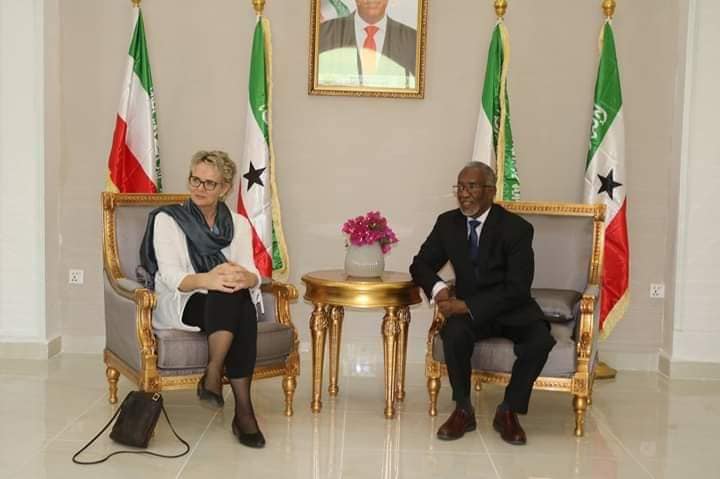
High-level delegation visits Hargeisa
Somaliland faces more election delays, Guurti Chairman
Parties reach a deadlock on election issues
Challenges facing elections:
• Current NEC,
• Future NEC selection criteria,
• Electoral Bylaw for regional seat allocation

High-level delegation of ambassadors from EU and UK reached today at Egal International Airport, Hargeisa, for talks relating to Somaliland’s delayed election.
This high-level delegation, which consisted of countries and other donors who support Somaliland’s election and democraization process, comes after the political parties deadlocked on the important issues for holding scheduled Elections this year.
Ministers of Foreign and Interior Affairs, Mr Mohamoud Haji Faratoon and Mr Mohamed Kahin welcomed the delegation at Hargeisa Airport’s VIP lounge briefly before been transported to the nearby Ambassador Hotel.
Sources close to the political parties have confirmed to us that this delegation comes to Hargeisa to meet both the government and opposition parties and to pressure them for an agreement on election matters.
Somaliland.com reported on January of this year, that

Somaliland Election face more delays
Chairman of Upper House of Parliament (Guurti)
The main opposition party doesn’t want current election commission members to prepare the next poll, increasing NEC members to nine and wants the selection of the next NEC members be divided fairly between parties.
Parties reach no agreement:
Yesterday, talks between Somaliland political parties ended up with no agreement on the election issues.
Mr Hussein Ahmed Aideed of Waddani (Opposition) told the local press that “parties have what looks-like irreconcilable difference stands on the current members of the National Electoral Commission (NEC) and the composition and procedure of selection of future NEC members.”
The election of Somaliland’s lower house of parliament (Representatives) is scheduled to take place at the end of this year. But the time for the election of local governments is not set although their extended term ended this week, on March 28, 2019.
Election Challenges
The f
The second challenge is political. The main opposition party, Waddani, has refused to work with the current NEC, contributing to the delays. Waddani contested the 2017 presidential poll results but withdrew its complaints after episodes of violence. Later, Waddani rescinded their complaints for the greater good of Somaliland’s stability.
Waddani continues to disagree that the current NEC members should prepare the ground for the next election. The party argues that the NEC term is ending on November, just weeks before the election and they previously oversaw a flawed election in 2017, “so how can they be trusted to conduct a better process now? Said Hussein Aideed, who is part of Waddani’s team for election negotiations.
Waddani has proposed dismissing the current NEC, but the president and the ruling Kulmiye party have refused these demands; replacing all the commissioners as that would call into question the legitimacy of its 2017 victory, saying the NEC is competent. The third political party, UCID (For Justice and Development), has recently inclined towards Kulmiye on most of these matters.
Negotiations were continuing sluggishly, but a recent meeting to discuss these concerns was reportedly ended without a deal.
Civil society representatives, SONSAF, lamented to the local press the difficult situation in which neither side is completely right or wrong. They believe Waddani’s complaints should be heard, and that the government hasn’t done enough to move beyond the impasse. They also called on the NEC commissioners to resign for the greater good.
They cited the similar historical precedent. When Kulmiye was in opposition in the mid-2009-2010, it complained about the composition of the NEC and had it replaced, what’s so different now that Kulmiye is in power.
The last challenge is more complicating one. It is the need for a new electoral law ahead of the contest that would deal with the representation of women and minorities. There is also pressure by some regions to reallocate the division of parliamentary seats ahead of the vote.
To solve the regional seat allocation, the Center for Policy Analysis (CPA) recommended that “the President should take leadership and active role in finding out a solution for the seat allocation of the House of Representatives, and conduct inclusive and consultative process.
Stay tuned
Somaliland.com will constantly update the news of the upcoming meetings of this delegation
Read also:
more recommended stories
 Somaliland Pursues Peace: First POW Exchange with Puntland Completed
Somaliland Pursues Peace: First POW Exchange with Puntland CompletedPresident Irro’s Dialogue-Based Approach Gains Momentum.
 From 1960 to Today: Somaliland’s Unbroken Case for Statehood
From 1960 to Today: Somaliland’s Unbroken Case for StatehoodSomaliland’s Foreign Minister Reaffirms Sovereignty, Urges.
 Gogol or Goodbye? Somalia’s Last Opportunity for Federal Reconciliation
Gogol or Goodbye? Somalia’s Last Opportunity for Federal ReconciliationBy Abdirahsid Elmi & Mohamed Musa.

Opinion: Reform Is a Marathon, Not a Sprint — Waddani’s Journey to Reform Somaliland – Hussein ElmiWhile slow reform progress raises concerns,.





Leave a Comment